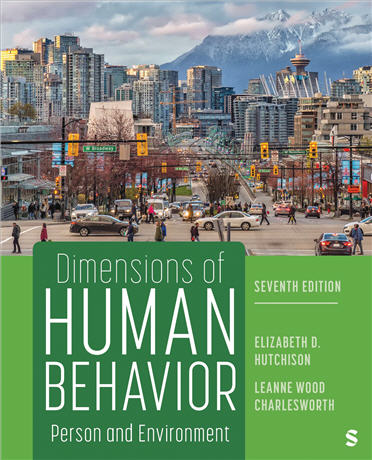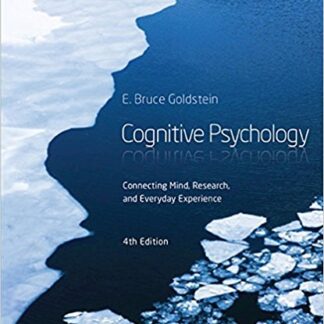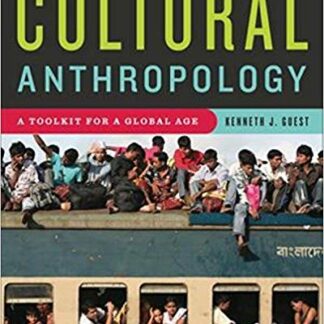Description
Dimensions of Human Behavior: Person and Environment 7th Edition, ISBN-13: 978-1071831458
[PDF eBook eTextbook] – Available Instantly
- Publisher: SAGE Publications, Inc; Seventh edition (January 22, 2024)
- Language: English
- ISBN-10: 1071831453
- ISBN-13: 978-1071831458
Dimensions of Human Behavior: Person and Environment offers a comprehensive examination of human behavior using a multidimensional framework, which breaks down the core content along three primary dimensions: Person, Environment and Time. Authors Elizabeth D. Hutchison and Leanne Wood Charlesworth delve into both the biological dimension and the social factors that influence human development and behavior. They encourage readers to relate their personal experiences to societal trends, emphasizing the pivotal interplay between the individual and the environment. Aligned with the 2022 curriculum guidelines set forth by the Council on Social Work Education (CSWE), the Seventh Edition includes a greater emphasis on culture and diversity, immigration, neuroscience, and the impact of the COVID-19 pandemic.
Table of Contents:
Case Studies
Preface
Acknowledgments
About the Editors
About the Contributors
About the Case Study Contributors
Part I A Multidimensional Approach for Multifaceted Social Work
Chapter 1 Human Behavior: A Multidimensional Approach
A Case Study About Person and Environment
Case Study 1.1: Joshua, Making a New Life
Human Behavior: Individual and Collective
Organization of Book
A Multidimensional Approach
Personal Dimensions
Environmental Dimensions
Time Dimensions
Advancing Human Rights and Social, Racial, Economic, and Environmental Justice: A Global Perspective
Human Rights and Social, Racial, Economic, and Environmental Justice
Anti-oppressive and Anti-racist Practice
Diversity
Equity and Social Inclusion
Knowing and Doing
Knowledge About the Case
Knowledge About the Self
Values and Ethics
Scientific Knowledge: Theory and Research
Theory
Empirical Research
Critical Use of Theory and Research
Implications for Social Work Practice
Key Terms
Active Learning
Chapter 2 Theoretical Perspectives on Human Behavior
A Case Study About Human Behavior Theory
Case Study 2.1: COVID-19 in the Family
Multiple Theoretical Perspectives for a Multidimensional Approach
Systems Perspective
Critical Analysis of the Systems Perspective
Critical Perspective
Critical Analysis of the Critical Perspective
Social Constructionist Perspective
Critical Analysis of the Social Constructionist Perspective
Psychodynamic Perspective
Critical Analysis of the Psychodynamic Perspective
Developmental Perspective
Critical Analysis of the Developmental Perspective
Learning Perspective
Critical Analysis of the Learning Perspective
Humanistic-Existential Perspective
Critical Analysis of the Humanistic-Existential Perspective
The Merits of Multiple Perspectives
Implications for Social Work Practice
Key Terms
Active Learning
Part II The Multiple Dimensions of Person
Chapter 3 The Biological Person
Six Case Studies of the Biological Person
Case Study 3.1: Cheryl’s Legs and Head
Case Study 3.2: A Diabetes Diagnosis for Jenna
Case Study 3.3: Shay and Terry
Case Study 3.4: HIV: Thomas’s Hero
Case Study 3.5: Louise and Huntington’s and Stewart’s Obesity and Cardiovascular Disease
Case Study 3.6: Juan and Belinda’s Sexual Life in Retirement
An Integrative Approach for Understanding the Intersection of Interior (Proximal) Biological Health and Illness and Exterior (Distal) Environmental Factors
Systems Taxonomy: Six Interior (Proximal) Environment Systems
Nervous System
Endocrine System
Immune System
Cardiovascular System
Musculoskeletal System
Reproductive System
Interactions of Exterior (Distal) Environments and Interior (Proximal) Health Environment
Implications for Social Work Practice
Key Terms
Active Learning
Chapter 4 The Psychological Person: Cognition, Emotion, Personality, and Self
Two Case Studies of Cognition, Emotion, Personality, and Self
Case Study 4.1: Janna Smith, Unemployed and Worried
Case Study 4.2: Charles Miller, Making a New Start
Cognition, Emotion, Personality, and Self: An Introduction
Theories of Cognition
Piaget’s (Stage) Theory of Cognitive Development
Information Processing Framework
Bandura’s Social Learning/Social Cognitive Theory
Gardner’s Theory of Multiple Intelligences
Salovey and Mayer’s Theory of Emotional Intelligence
Theories of Moral Development and Reasoning
Theories of Emotion
Noncognitive Physiological Theories of Emotion
James and Lange Theories of Emotion
Cannon-Bard Theory of Emotion
Izard’s Differential Emotions Theory (DET)
Davidson’s Theory of Six Emotional Dimensions
Cognitive Theories of Emotion
The Schachter-Singer Two-Factor Theory of Emotion
Lazarus’s Cognitive Appraisal Theory of Emotion
Weiner’s Attribution Framework of the Emotional Process
LeDoux and Brown’s Higher-Order Theory of Emotional Consciousness
Connection of Positive Emotions and Affect With Happiness and Well-Being
Theories of Personality
Trait Perspectives of Personality
Cognitive-Affective Theories of Personality
Pancha Kosha Theory of Personality: An Eastern-Based Theory
Biological Influences on Personality and Mental Illness
Theories of the Self
Cognitions, Emotions, Personality, Self, and Evidence-Supported Interventions (ESIs)
Shapiro’s Eye Movement Desensitization and Reprocessing (EMDR)
Beck’s Cognitive-Behavior Therapy (CBT)
Linehan’s Dialectical Behavior Therapy (DBT)
Implications for Social Work Practice
Key Terms
Active Learning
Chapter 5 The Psychosocial Person: Relationships, Stress, and Coping
A Case Study About the Psychosocial Person
Case Study 5.1: Dan’s Dilemma
The Self in Relationships and Relationships in the Self
Relational and Intersubjective Theories
Attachment Theory
Impact of Early Nurturing on Development
Feminist Theories of Relationships
Social Identity Theory
The Concept of Stress
Categories of Stress
Stress and Crisis
Traumatic Stress
Coping Processes
Biological Coping Processes
Psychological Coping Processes
Social Coping Processes
The Nature of Social Support
Virtual Support
How Social Support Aids in Coping
How Social Workers Evaluate Social Support
Spiritual or Religious Coping Processes
Coping and Traumatic Stress
Perspectives on Coping
Medical (Psychiatric) Perspective
Psychological Perspective
Sociological Perspective
Anthropological Perspective
Public Health Perspective
Social Work Perspective
Implications for Social Work Practice
Key Terms
Active Learning
Chapter 6 The Spiritual Person
Eight Case Studies of Spirituality and Religion
Case Study 6.1: Caroline’s Challenging Questions
Case Study 6.2: Naomi’s Health Crisis
Case Study 6.3: Matthew’s Faith Journey
Case Study 6.4: Trudy’s Search for the Sacred
Case Study 6.5: Leon’s Two Worlds
Case Study 6.6: Jean-Joseph’s Serving the Spirits
Case Study 6.7: Amira’s Quest for Self
Case Study 6.8: Beth’s Framework for Living
The Spiritual Dimension
The Meaning of Spirituality
Spirituality in the United States and Globally
Theories of Spiritual Development
Fowler’s Stages of Faith Development
Transpersonal Theories
The Role of Spirituality in Social Work
Developments in the Profession
Spirituality and Human Diversity
Race and Ethnicity
Sex and Gender
Sexual Orientation and Gender Identity
Disability
Age
Spiritually Sensitive Social Work Practice
Assessment
Micro, Mezzo, and Macro Social Work Practice
Implications for Social Work Practice
Key Terms
Active Learning
Part III The Multiple Dimensions of Environment
Chapter 7 The Physical Environment
Two Case Studies of Human Behavior and the Physical Environment
Case Study 7.1: Ben Watson’s Experience With Accessible and Inaccessible Environments
Case Study 7.2: Shanthi’s Need for Healthy Affordable Housing in Chennai, India
Theories of Human Behavior and the Physical Environment
Theories of Place
Theories of Spatial Behavior
Behavior Settings Theories
The Natural Environment
Positive and Negative Effects of Human Interaction with the Natural Environment
Natural Disasters and Human Behavior
The Built Environment
Housing
Houselessness
Race-Based Housing Segregation and Racial Health Disparities
Technology
Healing Environments
Inclusion, Diversity, Equity, and Accessibility in Built Environments
Ecological Justice, Sustainability, and Environmental Justice: A Social-Racial-Economic-Ecological Justice Perspective
Implications for Social Work Practice
Key Terms
Active Learning
Chapter 8 Cultures
A Case Study About Cultures
Case Study 8.1: Rubina, Living Across Cultures
What Is Culture?
Theories of Culture
Materialist Perspective
Mentalist Perspective
Other Theoretical Perspectives
Major Concepts in the Study of Culture
Values
Beliefs
Symbols
Language
Norms
Subcultures and Countercultures
Ideal Culture Versus Real Culture
Ethnocentrism and Cultural Relativism
Culture and Power
Race
Ethnicity
Gender
Sexuality
Social Class
Disability
Genes, Culture, and Cultural Change
Coevolution of Genes, Culture, and Behavior
Cultural Change
Implications for Social Work Practice
Key Terms
Active Learning
Chapter 9 Social Structure and Social Institutions: Global and National
A Case Study About Social Structure and Social Institutions
Case Study 9.1: Osvaldo Jimenez, Finding His Way as an Undocumented Student in the United States
Patterns of Social Life
Patterns of Inequality in Social Life
Contemporary Trends in Global and U.S. Social Institutions
Trends in the Government and Political Institution
Trends in the Economic Institution
Trends in the Educational Institution
Trends in the Health Institution
Trends in the Mass Media Institution
Trends in the Social Welfare Institution
Trends in the Religious Institution
Trends in the Family and Kinship Institution
Diversity, Equity, and Inclusion in Social Institutions
Implications for Social Work Practice
Key Terms
Active Learning
Chapter 10 Families
A Case Study About Family
Case Study 10.1: The Sharpe Family Adapts
What Is a Family?
Theoretical Perspectives for Understanding Families
Family Systems Perspective
Exchange and Choice Perspective on Families
Symbolic Interaction Perspective on Families
Intersectionality Perspective on Families
Life Course Perspective on Families
Family Stress Perspective
Diversity in Family Formation and Structure
Family Formation
Multigenerational and Nuclear Family Households
Single-Parent Families
Childless Couples
Repartnered Families
Adoptive and Foster Families
Challenges to Family Life
Economic Hardship
Racialized Bias and Discrimination
Anti-LGBTQ+ Bias and Discrimination
Migration
Domestic and Family Violence
Divorce and Cohabitation Dissolution
Problematic Substance Use
Implications for Social Work Practice
Key Terms
Active Learning
Chapter 11 Small Groups
A Case Study About Small Groups
Case Study 11.1: The Sexuality and Gender Group at a Women’s Residential Substance Abuse Treatment Facility
Small Groups in Social Work
Therapy Groups
Mutual Aid Groups
Psychoeducational Groups
Self-Help Groups
Task Groups
Technology-Facilitated Groups
Dimensions of Group Structure
Group Composition
Heterogeneity Versus Homogeneity
Social Justice Issues in Social Work Groups
Basic Group Processes
Theories of Group Processes
Psychodynamic Theory
Symbolic Interaction Theory
Status Characteristics and Expectation States Theories
Exchange Theory
Self-Categorization Theory
Group Development
Stage Theories and Models
Process Models
Group Dynamics
Formal and Informal Leadership
Formal and Informal Roles
Communication Networks
Group Cohesiveness
Interdisciplinary Teams and Leadership
Interdisciplinary Teams and Social Work
Social Work Leadership
Implications for Social Work Practice
Key Terms
Active Learning
Chapter 12 Organizations
A Case Study About Organizations
Case Study 12.1: Changing Leadership, Changing Times at Beacon Center
Organizations: An Introduction
Ubiquitous Across the Human Life Course
Formal and Informal Features of Organizations
Theoretical Perspectives on Organizations
Demographic Perspective
Theories of Internal Organizational Demography
Organizational Ecology: A Macro Demographic Theory
Relational Perspective
Resource Dependence Theory
Social Capital Theory
Social Network Theory
Cultural Perspective
National Culture Approach
Institutional Approach
Diversity and Inclusion Approach
Organizational Culture Interacting With Organizational Learning Approaches
Impact of Organizations on Society
Burnout: A Negative Organizational Outcome
Human Service Organizations
Leadership in Human Service Organizations
Implications for Social Work Practice
Key Terms
Active Learning
Chapter 13 Communities
Three Case Studies of Community
Case Study 13.1: Creating Community on Wood Street, Oakland, California
Case Study 13.2: A Rural West Virginia Community Struggling to Recover
Case Study 13.3: The Korean Parents’ Network for People with Disabilities (KPNPD)
Communities: An Introduction
What Is Community?
Geographical and Relational Communities
Theoretical Approaches to Community
Ecological Approach
Relational Approach
Social Capital and Social Network Theories
Sense of Community Theory
Cultural Approach
Critical Approach
Social Work and Communities
Issues and Themes in Community Practice
Implications for Social Work Practice
Key Terms
Active Learning
Chapter 14 Social Movements
A Case Study About a Social Movement
Case Study 14.1: Fighting for Our Water, Land, and Air
Social Movements: An Introduction
Movements on the Left and Right
Movement–Countermovement Interactions
Theoretical Perspectives on Social Movements
Mobilizing Structures Perspective
Informal and Formal Structures
Information and Communication Technology (ICT)
Cultural Framing Perspective
Diagnostic Framing
Prognostic Framing
Motivational Framing
Political Process Perspective
Political Opportunities
Political Threats
Emerging Perspectives
The Role of Emotions in Social Movement Mobilization
The Intersectionality Approach
Social Movement Trajectories and Outcomes
Social Movement Trajectories
Social Movement Outcomes
Social Work and Social Movements
Implications for Social Work Practice
Key Terms
Active Learning
Glossary
References
Index
Elizabeth D. Hutchison received her MSW from the George Warren Brown School of Social Work at Washington University in St. Louis and her PhD from the University at Albany, State University of New York. She was on the faculty in the social work department at Elms College from 1980 to 1987 and was chair of the department from 1982 to 1987. She was on the faculty in the School of Social Work at Virginia Commonwealth University from 1987 to 2009, where she taught courses in human behavior and the social environment, social work and social justice, and child and family policy; she also served as field practicum liaison. She has been a social worker in health, mental health, aging, and child and family welfare settings and engaged in volunteer work with incarcerated women and environmental justice for farm workers in the Coachella Valley of California. She is committed to providing social workers with comprehensive, current, and useful frameworks for thinking about human behavior. Her other research interests focus on child and family welfare. She lives in Reno, Nevada, where she enjoys hiking around Lake Tahoe and being a hands-on grandmother to two humans and one dog. She collaborates with the Unitarian Universalist Fellowship of Northern Nevada on local social, racial, economic, and environmental justice issues.
Leanne Wood received her MSW from the University at Albany and PhD from the School of Social Work at Virginia Commonwealth University. She began her career as a social worker in the child welfare systems in Washington, DC, and Virginia. After obtaining her PhD, she worked in the research and evaluation field in Baltimore. In 2003, she joined the Nazareth University Department of Social Work in Rochester, New York, as a full-time faculty member, teaching across the social work curriculum. She also began collaborating with the local homeless services provider network on a variety of initiatives, including a Photovoice project and the local Project Homeless Connect. She has been a yoga instructor and has facilitated workshops for diverse audiences on self-care. Recently, she has taken on the department chair role. She continues to teach and advise social work students and is particularly passionate about teaching the course “Theory and Human Development” to students representing a variety of professions within Nazareth’s College of Interprofessional Health and Human Services.
What makes us different?
• Instant Download
• Always Competitive Pricing
• 100% Privacy
• FREE Sample Available
• 24-7 LIVE Customer Support





